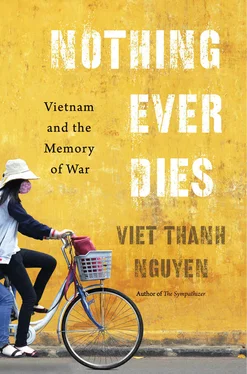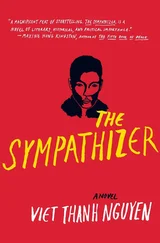16. Ninh, The Sorrow of War , 94.
17. Ibid., 233.
18. Vo’s The Bamboo Gulag , 209, provides more information on the statue’s sculptor Nguyen Thanh Thu.
19. Herr, Dispatches , 330.
20. Ninh, The Sorrow of War , 88.
21. Ibid.
22. Aguilar-San Juan, Little Saigons , 64.
23. Nhi Lieu, The American Dream in Vietnamese .
24. On postwar American policies in regard to Vietnam, see Martini, Invisible Enemies.
25. Nora, “Between Memory and History.”
26. Quoted in Ch’ien, Weird English , Kindle edition, loc. 819.
27. Boym, The Future of Nostalgia , viii, 41–48.
28. Davey, “In Kansas, Proposed Monument to a Wartime Friendship Tests the Bond.”
29. Cargill and Huynh, Voices of Vietnamese Boat People , 151–52.
2. ON REMEMBERING OTHERS
1. Ecclesiasticus 44:8–9, King James Bible. On the relationship of religion to memory and this war, see Tran, The Vietnam War and Theologies of Memory , particularly the section on the Vietnam Veterans Memorial (212–35).
2. Some useful accounts of the making of Maya Lin’s memorial, the controversies around it, and the power of its aesthetic, can be found in Ashabranner, Always to Remember ; Edkins, Trauma and the Memory of Politics ; Griswold, Forgiveness ; Hagopian, The Vietnam War in American Memory ; Hass, Carried to the Wall ; Huyssen, Present Pasts ; Lin, Boundaries ; Marling and Silberman, “The Statue at the Wall”; Menand, American Studies ; Shan, “Trauma, Re(-)membering, and Reconciliation”; Sturken, Tangled Memories ; and Wagner-Pacifici and Schwartz, “The Vietnam Veterans Memorial.”
3. Isaacs’s Vietnam Shadows is an informative account of this postwar period and the impact of the war on American memory and life.
4. See McMahon’s “Contested Memory” for a pithy summary of how the war’s memory was transformed politically and culturally.
5. Dowd, “After the War.”
6. Appy, American Reckoning , Kindle edition, loc. 3689.
7. Assman, “From Moses the Egyptian ,” 211.
8. Swofford, Jarhead , 5–6.
9. Lin, Boundaries , 5:06.
10. DuBois, The Souls of Black Folk , 5.
11. Ibid.
12. Tatum, The Mourner’s Song , 9.
13. Ninh, The Sorrow of War , 180.
14. Margalit, The Ethics of Memory , 87.
15. Ricoeur, Memory, History, Forgetting , 496.
16. President Obama proclaiming March 29, 2012, as Vietnam Veterans Day, commemorating fifty years since American involvement began in Vietnam, in “Presidential Proclamation.”
17. For a critique of Margalit’s distinction between ethics and morals when it comes to memory, see Blustein, The Moral Demands of Memory .
18. Ricoeur, Memory, History, Forgetting , 82–83.
19. Duong, in Treacherous Subjects , shows how Vietnamese patriarchy of all ideological persuasions has often aimed its ire at women.
20. Young, The Vietnam Wars , 50.
21. Duong, Novel without a Name , 138.
22. Ibid., 84.
23. Ibid., 62.
24. Ibid., 256.
25. Fussell, The Great War and Modern Memory , 341.
26. Heinemann, Close Quarters , 261.
27. Baudrillard, Simulacra and Simulation , 59.
28. Chong, The Oriental Obscene .
29. Sturken, Tangled Memories , 62–63.
30. Ibid., 82.
31. Lesser, “Presence of Mind.”
32. For a critique of how the United States has remembered Hmong soldiers, see Vang, “The Refugee Soldier.”
33. Moua, Bamboo among the Oaks , 61–62.
34. Ricoeur, Memory, History, Forgetting , 89.
35. Gilroy, Against Race , 115.
36. Ibid., 114.
3. ON THE INHUMANITIES
1. Solzhenitsyn, The Gulag Archipelago 1918–1956 , 168
2. Some of the scholars who have worked on the distinction between sympathy and empathy, or on the power or problems of one or both of those two feelings, include: Bennet, Empathic Vision ; Berlant, “Introduction: Compassion (and Withholding)”; Garber, “Compassion”; and Woodward, “Calculating Compassion.”
3. For a compelling study of another case where war survivors were reluctant to see themselves as victimizers, turning instead to being only victims, see Yoneyama, Hiroshima Traces .
4. Butler, Precarious Life , 150.
5. Chong, The Girl in the Picture.
6. Turse, Kill Anything That Moves .
7. For an account of how South Vietnamese women functioned in the American imagination, see Stur, Beyond Combat , 17–63. For memories of Vietnamese women themselves, see Nguyen, Memory Is Another Country.
8. Levinas, Totality and Infinity , 23.
9. Ibid., 51.
10. Ibid., 47.
11. Levinas says that “freedom comes from an obedience to Being; it is not man who possesses freedom; it is freedom that possesses man” with “the primacy of the same, which marks the direction of and defines the whole of Western philosophy” (45); “such is the definition of freedom: to maintain oneself against the other” (46). Such philosophy does not question injustice and leads to “power, to imperialist domination, to tyranny” (47).
12. Ibid., see 26–27 for a discussion of infinity and the relation of same to other.
13. Ibid., 225.
14. See Parikh’s An Ethics of Betrayal for another reading and application of Levinas to the place of minorities and others. In Totality and Infinity , Levinas has this to say about justice and its alignment with the Other: “justice consists in recognizing in the Other my master. Equality among persons means nothing of itself; it has an economic meaning and presupposes money, and already rests on justice — which, when well-ordered, begins with the Other” (72); “justice is a right to speak” (298); “the goodness of being for the Other, in justice” (302).
15. From the film Derrida , Derrida says: “In general, I try and distinguish between what one calls the Future and “l’avenir” [the ‘to come’]. The future is that which — tomorrow, later, next century — will be. There is a future which is predictable, programmed, scheduled, foreseeable. But there is a future, l’avenir (to come) which refers to someone who comes whose arrival is totally unexpected. For me, that is the real future. That which is totally unpredictable. The Other who comes without my being able to anticipate their arrival. So if there is a real future, beyond the other known future, it is l’avenir in that it is the coming of the Other when I am completely unable to foresee their arrival.” But as I argue elsewhere in this book, the Other is not only possibly a sign of justice but of terror.
16. Herr, Dispatches , 20.
17. See Grossman’s On Killing for an examination of how distance to the target affects the killer.
18. Duong, Novel without a Name , 237.
19. Levinas, Totality and Infinity , 225.
20. Ibid., 262.
21. Kundera, The Book of Laughter and Forgetting , 4.
22. Foucault, The History of Sexuality , 93.
23. This is the first lesson that McNamara offers in Morris’s film The Fog of War.
24. Chandler’s Voices from S-21 is a powerful account of the prison and its victims, as is Maguire’s Facing Death in Cambodia .
25. Becker’s When the War Was Over was helpful in understanding this history.
26. Ratner, In the Shadow of the Banyan , 277.
Читать дальше












